How Is AI Being Used In Law Firms Today?
How Is AI Being Used In Law Firms Today?
In the legal field, a single case can take hours of hours of work. That’s to be expected as cases can take months or even years to conclude. And, there are heaps of operational tasks that legal professionals have to do in the background.
Artificial intelligence is reshaping how industries work, and the legal field is no different. In this article, we’ll look at how AI is optimizing the legal process today, and saving law firms dozens of hours.

What is Artificial Intelligence (AI)?
AI development is all about teaching machines to think and learn, just like humans do. So, instead of just following instructions, AI can understand language, recognize things, make decisions, and even get better at legal practice over time.
In the legal field, generative AI is one of the best tools legal professionals can have. For example, AI tools like Briefpoint automate the preparation of discovery response and request documents.
How is AI Being Used in the Legal Field?
AI offers a multitude of benefits for the legal industry, including the power to automate routine tasks and analyze large volumes of data. Here are some of the legal tasks AI can streamline:
Document Review
AI helps legal assistants review documents by employing natural language processing (NLP) to analyze and classify documents more quickly. This capability is particularly useful in litigation and due diligence, where time and accuracy are of the essence.
Document Automation
Generative AI like Briefpoint can draft standard discovery response documents, streamlining the drafting process and saving time for litigators. This type of tool is called document automation.
Litigation Analysis
Using data from past cases, AI tools can predict and identify patterns, assess the strengths and weaknesses of cases, and recommend the most effective legal strategies. This insight allows lawyers to make informed decisions and better advise their clients.
What Are The Benefits of Using AI in Law Firms?
From case analysis to litigation, AI can augment and improve almost all parts of the legal process. Below are the potential benefits an AI tool can provide for the legal industry:
- Better Accuracy: AI minimizes human errors in document analysis and legal research, allowing for more consistent documents and reducing problems arising from inaccuracies.
- Cost Reduction: By automating routine tasks, machine learning AI can lower operational costs.
- Mass Data Capture: AI’s ability to analyze large datasets can uncover trends and patterns, providing valuable insights for case strategy and legal advice in most legal departments. Pairing this feature with generative AI can also help increase the accuracy of legal drafting.
Lawyer’s vs Artificial Intelligence
While AI systems can perform many tasks, the nuanced judgment, ethical considerations, and persuasive abilities of skilled lawyers remain irreplaceable.
The ideal scenario is not machine learning AI replacing lawyers but augmenting their capabilities, allowing them to focus on the high-level strategic and interpersonal aspects of legal business.
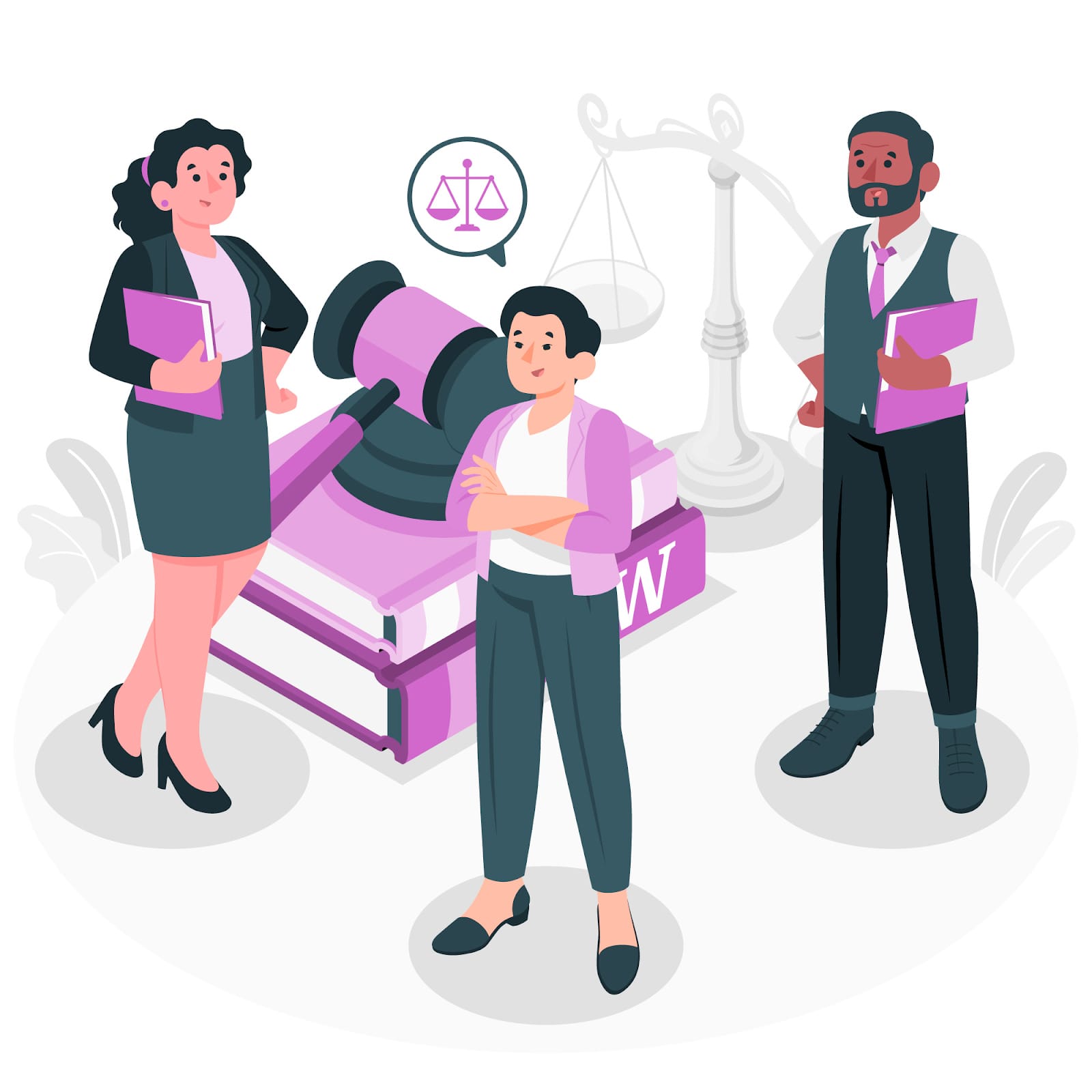
What Does AI Integration Look Like For You?
The integration of AI into the legal industry is not just a simple helping hand for law firms; it’s a transformative shift that is redefining how legal work is done.
Briefpoint is committed to leading this charge, giving law firms the tools and ease of use necessary to implement AI effectively.
Savings of Implementing Briefpoint Into Your Firm
Discovery responses cost firms $23,240, per year, per attorney. The $23,240 estimate assumes an associate attorney salary of $150,000 (including benefits – or $83 an hour), 20 cases per year/associate, 4 discovery sets per case, 30 questions per set, 3.5 hours spent responding to each set, and 1800 hours of billable hours per year.
Under these assumptions, you save $20,477 using Briefpoint, per year, per attorney.
Test Briefpoint yourself by scheduling a demo here.
FAQs About AI In Law Firms
Will AI replace lawyers?
No, AI technology is intended to augment the capabilities of lawyers, not replace them. It automates routine tasks and provides valuable insights, allowing lawyers to focus on complex legal work and client interaction for better legal business.
Is AI in law ethical?
Yes, when used responsibly. The ethical use of AI technology in law involves transparency, accountability, and ensuring that AI tools are used to progress fairness. Every law firm must exercise due diligence when incorporating a new tool like generative AI into their workflow.
How can I start integrating AI into my law firm?
Begin by identifying areas where AI can have the most significant impact, such as document management or litigation analysis. Partner with a trusted AI solutions provider like Briefpoint to create an AI strategy that meets your firm’s needs.
The information provided on this website does not, and is not intended to, constitute legal advice; instead, all information, content, and materials available on this site are for general informational purposes only. Information on this website may not constitute the most up-to-date legal or other information. This website contains links to other third-party websites. Such links are only for the convenience of the reader, user or browser.
Readers of this website should contact their attorney to obtain advice with respect to any particular legal matter. No reader, user, or browser of this site should act or refrain from acting on the basis of information on this site without first seeking legal advice from counsel in the relevant jurisdiction. Only your individual attorney can provide assurances that the information contained herein – and your interpretation of it – is applicable or appropriate to your particular situation. Use of, and access to, this website or any of the links or resources contained within the site do not create an attorney-client relationship between the reader, user, or browser and website authors, contributors, contributing law firms, or committee members and their respective employers.
AI For Lawyers and How it Affects the Future of the Law Industry
AI For Lawyers and How it Affects the Future of the Law Industry
Observing the patterns of various sectors, it has become evident that artificial intelligence is woven into their standard operating protocols, with the realm of law being a prime example. While often in intense and fast-paced environments, law firms still need help with many background tasks that simply take up too much time.
AI tools for lawyers take on the most repetitive and time-consuming tasks, allowing legal professionals to focus on more valuable parts of litigation.
In this article, we’ll review AI tools specifically designed for lawyers, how they can benefit law firms, and their overall impact on the industry.

What Type of AI Are We Talking About?
AI is the intelligence of computers that are programmed to mimic humans. But unlike humans, they can process massive amounts of data in as little as a few seconds. This makes AI so useful for industries that manage and digest much information, including law firms.
Machine Learning
At the core of artificial intelligence, machine learning equips software with an intuitive grasp of data. Machine learning algorithms slowly become better and more accurate over time; they are self-learning algorithms.
Natural Language Processing
Natural language processing (NLP) allows computers to understand, interpret, and generate human language. In the legal domain, NLP can be a powerful tool for analyzing legal documents, contracts, and legislation with the help of human input and supervision.

What Can AI Do For The Legal Industry?
AI has the potential to revolutionize how law firms work. More specifically, it can streamline numerous processes, including:
Discovery
During the discovery process, lawyers and paralegals often have to review thousands of documents to find evidence relevant to the case. Legal document automation makes this process more straightforward due to its ability to simultaneously process vast amounts of information.
AI discovery software enables attorneys to sift through documents by employing search terms or particular criteria, like dates or geographic locations. In contrast, lawyers without AI would have to spend weeks on this.
Generative artificial intelligence is another highly beneficial AI tool for the discovery process. Through sophisticated algorithms, generative AI can comb through extensive datasets, pinpoint relevant information, and draft discovery responses and requests.
Legal Research
Legal research is a time-intensive task that requires sifting through countless legal documents, statutes, and case law to find precedents relevant to the case. AI-powered legal research tools are changing this landscape by processing and analyzing vast quantities of legal texts in a fraction of the time.
Aside from searching for keywords, legal AI can understand the context, interpret the semantics of legal language, and draw connections between legal precedents and current cases.
Due Diligence
Due diligence is a critical component of legal work. This is especially true in significant transactions like mergers and acquisitions, where understanding entities’ legal and financial health is paramount. Without AI, due diligence is a labor-intensive process that requires weeks or even months of rigorous examination of documents to identify liabilities, compliance issues, and other potential risks.
Legal AI streamlines this process through its ability to rapidly analyze large volumes of data, identifying anomalies, patterns, and risks that would take humans considerably longer to uncover.
Contract Review and Analysis
Some AI tools are capable of examining contracts in detail at faster speeds. These AI-driven tools can identify clauses that deviate from standard language, assess risk levels, and suggest modifications based on prevailing laws and legal standards.
This specific function of AI speeds up the contract review process, enhances the accuracy and consistency of contracts, and minimizes the risk of disputes and litigation,

What Are The Benefits of AI For Legal Professionals?
The integration of AI makes perfect sense for any law firm that wants to optimize its processes. Here’s an expanded look at the key benefits AI brings to the table for the legal profession:
Efficiency
Document sorting, evidence review, and even certain aspects of legal research can now be handled by AI tools, letting legal professionals allocate their time to more substantial legal work.
For instance, AI-enabled document review tools can analyze thousands of documents in the time it takes a human to go through a handful, drastically reducing the lead time on cases and allowing lawyers to easily meet tight deadlines.
Accuracy
One of the standout features of AI is its ability to minimize errors in tasks that involve data processing and analysis. This means more accurate document review, fewer research oversights, and better risk assessment.
Legal AI tools are designed to recognize patterns and anomalies consistently that surpass human capability, which is particularly valuable in identifying relevant case law, precedents, and statutory requirements.
Cost Reduction
The economic impact of AI on legal practices is significant. Through automation, AI reduces the hours lawyers and paralegals need to spend drafting.
Plus, the time savings may allow law firms to eliminate redundant roles or reduce the staff they need for routine tasks, which is another massive aspect.
How Can AI Benefit Law Firm Clients?
Legal AI tools help create more efficient workflows in law firms, but they can also have direct benefits to clients, including:
- Speed: The streamlined efficiency of AI leads to quicker turnaround times, meaning clients see faster outcomes and resolutions.
- Reduced Costs: Savings realized from AI’s operational improvements reduce hourly costs.
- Strategy: AI’s precision and advanced analytics support having more accurate and strategically sound legal approaches.
Legal Document Automation
The discovery phase of litigation is often the most time-consuming and has much room for error. Briefpoint recognized this long-standing issue and designed an AI tool to eliminate that bottleneck.
Briefpoint automates the preparation of discovery request and discovery response documents, including but not limited to:
- Requests for Admission
- Requests for Production
- Interrogatories
Plus, the process is simple: you upload the discovery request, add objections and responses to your discovery response, and then download the document in Word to finish it up. It’s easy, straightforward, and takes hours off the usual process.
How Briefpoint Helps You Save
Discovery responses cost firms $23,240, per year, per attorney. $23,240 estimate assumes an associate attorney salary of $150,000 (including benefits – or $83 an hour), 20 cases per year/per associate, 4 discovery sets per case, 30 questions per set, 3.5 hours spent responding to each set, and 1800 hours of billable hours per year.
Under these assumptions, you save $20,477 using Briefpoint, per year, per attorney.
Test Briefpoint yourself by scheduling a demo here.
Is AI An Advantage?
AI is continuously evolving, which can only mean more opportunities to come for tomorrow’s legal industry. If you’re on the fence about using AI for your law firm, there’s no need to fully integrate AI right away. Instead, you can start small by optimizing one aspect of your legal research process: discovery.
Briefpoint is a bespoke tool committed to harnessing the power of AI to transform legal services, making them more efficient, accurate, and accessible. For legal professionals, embracing AI is not just about staying ahead in a competitive landscape; it’s about redefining the very essence of legal practice for the better.
FAQs on AI For Lawyers
Is AI going to replace lawyers?
No, AI is designed to augment the capabilities of lawyers, not replace them. It automates routine tasks, allowing lawyers to focus on more complex and strategic aspects of their work.
How secure is AI in handling sensitive legal information?
AI systems used in the legal industry are designed with robust security measures to protect sensitive information. However, it’s crucial to choose reputable AI solutions that comply with industry-standard security protocols.
Can small law firms afford to implement AI?
Yes, there are AI solutions available at various price points, making them accessible for law firms of all sizes. Additionally, the long-term savings in time and operational costs can make AI a worthwhile investment for small firms.
How can I start integrating AI into my legal practice?
Begin by identifying areas where AI can have the most impact, such as document review or legal research. Partner with a trusted AI solutions provider like Briefpoint to ensure a smooth integration process tailored to your firm’s specific needs.
The information provided on this website does not, and is not intended to, constitute legal advice; instead, all information, content, and materials available on this site are for general informational purposes only. Information on this website may not constitute the most up-to-date legal or other information. This website contains links to other third-party websites. Such links are only for the convenience of the reader, user or browser.
Readers of this website should contact their attorney to obtain advice with respect to any particular legal matter. No reader, user, or browser of this site should act or refrain from acting on the basis of information on this site without first seeking legal advice from counsel in the relevant jurisdiction. Only your individual attorney can provide assurances that the information contained herein – and your interpretation of it – is applicable or appropriate to your particular situation. Use of, and access to, this website or any of the links or resources contained within the site do not create an attorney-client relationship between the reader, user, or browser and website authors, contributors, contributing law firms, or committee members and their respective employers.
Will AI Replace Lawyers? The Future of Legal AI
Will AI Replace Lawyers? The Future of Legal AI
Artificial intelligence (AI) is making leaps and bounds in refining workflows across many industries, including law. While many fields were quick to adapt to AI powered tools, the legal sector, with its storied tradition and adherence to precedent, finds itself at a crossroads.
Law firms that have integrated AI into their processes continue to reap these tools’ many benefits. More conservative institutions may be hesitant to try this new technology, mainly due to the rigid rules within the legal industry. Some are even asking: Will AI replace lawyers?
In this guide, we’ll go over how AI affects legal work and how it might change the legal industry as we know it.

What Are AI-Powered Legal Tools?
AI-powered legal tools are software or platforms that use artificial intelligence to perform tasks traditionally done by lawyers and legal professionals. These include, but are not limited to:
- Document automation
- Document review
- Legal research
- Contract analysis
- Case pattern recognition
These tools leverage natural language processing (NLP), machine learning, and data analytics to process vast amounts of information faster and with minimal human error.
Advantages of Integrating AI into Legal Workflows
The adoption of AI in legal practices comes with a plethora of benefits:
- Efficiency and Productivity: AI takes the grunt work off lawyers’ plates, freeing them up to dive deeper into strategy and the complex parts of their cases.
- Cost Reduction: AI may help law firms with administrative roles that handle routine legal tasks.
- Human Errors: The meticulousness of AI in managing data can mitigate human mistakes, thereby bolstering the dependability of legal documentation and investigatory work.
Potential Risks of Employing AI in Legal Practice
Despite its benefits, the use of AI in legal practice is not without risks:
- Data Security: The reliance on digital platforms may increase the risk of data breaches and cyber-attacks, making it still necessary for a law firm to increase cybersecurity.
- Ethical Concerns: The impersonal nature of AI raises questions about client confidentiality, privacy, and the erosion of the lawyer-client relationship. Hence, AI is highly unlikely to replace human lawyers.
- Dependence on Technology: Overreliance on AI tools may lead to skill atrophy among legal professionals. AI should be seen as a sidekick in law firms, improving operational efficiency but never taking the wheel from seasoned pros.
Will AI Replace Paralegals?
The advent of AI has sparked a debate on the future role of paralegals. These professionals have long been the cornerstone, deftly handling legal investigations, drafting documents, and engaging with clients.
With AI’s capacity to automate a wide array of routine tasks, there’s concern over the impact this technology will have on the employment and duties of paralegals. However, this concern, while understandable, overlooks the nuanced and complementary relationship between AI and human skills.
AI can enhance efficiency, but it lacks the human touch, empathy, and ethical judgment that paralegals bring to their work. Rather than replace, AI is more likely to redefine their roles, emphasizing their advisory and client relationship skills.
Why AI Won’t Replace Lawyers
In this discussion, we need to acknowledge AI’s benefits while also recognizing the unique aspects of legal practice that it cannot replace:
- Complex Reasoning and Judgment: AI cannot understand context, interpret nuances, and make tough ethical decisions. On the other hand, lawyers interpret laws within the context of difficult human situations and navigate through gray areas where legal precedents might be conflicting or absent.
- Emotional Intelligence: Building relationships, understanding client emotions, and exercising empathy are inherently human traits that AI cannot replicate. The nuances of human emotion and the subtleties of interpersonal communication are realms that AI cannot navigate.
- Adaptability: Lawyers can adapt to unexpected changes in a case or the legal environment, a flexibility that AI currently lacks.
Integrating Artificial Intelligence into the Practice of Law
For law firms and professionals, the key is not to resist AI but to embrace it strategically. Integration can take several forms:
Augmentation
AI’s primary role in legal practice is augmentation, where technology acts as a powerful assistant rather than a replacement. Law firms can leverage AI’s strengths—speed, accuracy, and data processing capabilities—to enhance the natural abilities of their legal professionals.
For instance, AI can take over tedious tasks, allowing lawyers to focus on strategy, client counseling, and courtroom advocacy.
Education and Training
Law firms must invest in programs that equip their lawyers and staff with the knowledge and skills to utilize AI tools effectively.
Embracing AI in law means getting to grips with what it can and can’t do, figuring out how we chat with these systems, and keeping up-to-speed on tech trends.
Ethical Guidelines
Adopting AI in legal practice raises critical ethical questions, from data privacy and security to the fairness and transparency of AI-driven decisions. Developing clear ethical guidelines is essential for law firms looking to integrate AI into their operations.
These guidelines should address the responsible use of AI, including issues related to client confidentiality, the accuracy of AI-generated information, and the mitigation of bias.

Streamlining the Process of Preparing Legal Documents
In the legal profession, the discovery process tends to be the most tedious step of litigation, taking up endless hours that can be spent on more valuable tasks.
Briefpoint can help your law firm make this process easier and more efficient. This bespoke tool automates the preparation of discovery request and response documents, including but not limited to:
- Requests for Admission
- Requests for Production
- Interrogatories
What Is Briefpoint AI?
The question of whether AI will replace lawyers is complex, but the answer, for now, is a resounding no. AI is designed to augment the most tedious processes in the legal industry, but its limitations cannot replace the skills, experience, and humanity a lawyer has.
Using Briefpoint is a way to leverage AI to enhance your services while maintaining the core values of trust, professionalism, and personal engagement. The future of legal AI is not about replacement; it’s about revolutionizing how legal professionals work.
How Briefpoint Can Help Your Firm
Discovery responses cost firms $23,240, per year, per attorney. $23,240 estimate assumes an associate attorney salary of $150,000 (including benefits – or $83 an hour), 20 cases per year/per associate, 4 discovery sets per case, 30 questions per set, 3.5 hours spent responding to each set, and 1800 hours of billable hours per year.
Under these assumptions, you save $20,477 using Briefpoint, per year, per attorney.
Test Briefpoint yourself by scheduling a demo here.
FAQs about AI Replacing Lawyers
Can AI provide legal advice?
While AI can assist in providing information and predictions based on legal data, it cannot currently understand context and human nuances fully, which are critical in legal advice.
Will AI make lawyers obsolete?
No, AI will not make lawyers obsolete. Instead, it will transform the profession, emphasizing the skills and qualities that are uniquely human.
How can I prepare for the integration of AI into my practice?
Stay informed about the latest AI developments, invest in training for yourself and your team, and consider how AI can complement your current practices to enhance efficiency and service quality.
The information provided on this website does not, and is not intended to, constitute legal advice; instead, all information, content, and materials available on this site are for general informational purposes only. Information on this website may not constitute the most up-to-date legal or other information. This website contains links to other third-party websites. Such links are only for the convenience of the reader, user or browser.
Readers of this website should contact their attorney to obtain advice with respect to any particular legal matter. No reader, user, or browser of this site should act or refrain from acting on the basis of information on this site without first seeking legal advice from counsel in the relevant jurisdiction. Only your individual attorney can provide assurances that the information contained herein – and your interpretation of it – is applicable or appropriate to your particular situation. Use of, and access to, this website or any of the links or resources contained within the site do not create an attorney-client relationship between the reader, user, or browser and website authors, contributors, contributing law firms, or committee members and their respective employers.
Top 10 Legal Technology Trends in 2024
Top 10 Legal Technology Trends in 2024
The legal industry looks a lot different than how it was just a few years ago. In the past, traditional operational practices seemed to have peaked efficiency, today those same practices seem like a disadvantage.
Now more than ever, law firms are leveraging technology advancements to increase efficiency, optimize their bottom line, and improve client satisfaction. If you want to reap the same benefits for your firm, here are the top legal technology trends you should look out for.

The Best Legal Technology Trends of 2024
A new year always comes with emerging technologies in various fields, including the legal industry. As legal professionals become more open to technology, more companies offer legal tech solutions that aim to address the industry’s needs.
Here are some of the latest legal tech trends that you should look into:
1. Automation
Automation technology takes over repetitive and time-consuming tasks, such as document drafting, client intake processes, and compliance checks.
By automating these tasks, law firms can significantly reduce manual labor, mitigate the risk of human errors, and ensure consistency in legal documents and procedures. Similar to other legal tech trends on the list, automation allows law firms to allocate more time to more valuable activities.
You can harness these abilities with:
- Briefpoint: Automates the preparation of discovery request and discovery response documents, saving hours of work that would have otherwise been spent on reviewing requests and drafting responses.
- LawGeex: Automates the contract review process and helps legal teams to efficiently review, approve, or escalate contracts by comparing them against predefined criteria, significantly reducing the time and effort involved in manual reviews.
- Contractbook: Provides end-to-end contract lifecycle management with a strong emphasis on automation. It can automatically review legal contracts, helping streamline the process of contract management.
2. Legal Case Management Software
Legal Case Management Software is a valuable tool for centralizing case files, communications, billing, and scheduling into a unified platform. This software helps improve a law firm’s efficiency by automating administrative tasks, overseeing case tracking, and improving client relationship management.
The integration of legal case management software allows legal professionals to focus on more high-value legal work, thereby increasing productivity and reducing the potential for human error. Companies that cater to this emerging legal tech trend include:
- Clio: A cloud-based legal practice management software offering features like case management, billing, and client communication. Designed to enhance productivity and allow remote access to important information.
- MyCase: An all-in-one legal management solution focusing on case management, billing, and secure client communication. Known for its user-friendly interface, it aims to improve client experiences and streamline administrative tasks.
- Smokeball: Offers case management, billing, and automation features. It emphasizes ease of use, allowing for customization and automation to boost efficiency and profitability.
3. Artificial Intelligence
Artificial Intelligence (AI) is at the forefront of legal innovation, offering capabilities like predictive analytics in case outcomes and automating complex document review processes.
Legal AI tools help law firms analyze vast amounts of data for informed decision-making, streamlined litigation preparation, and personalized client interactions. You can take advantage of this significant legal technology trend with:
- Luminance: Uses machine learning to improve the process of document review for due diligence, compliance, and litigation tasks. Its AI technology adapts to the specific needs of a legal team, identifying patterns and anomalies in data, thereby increasing the speed and accuracy of legal document analysis.
- ROSS Intelligence: Leverages artificial intelligence to offer a legal research platform that streamlines the process of finding relevant case law and legal precedents. It allows legal professionals to ask natural language questions and receive instant, accurate answers, enhancing research efficiency and accuracy.
- LegalSifter: Combines AI with legal expertise to help users review contracts more efficiently. The platform suggests edits, identifies key clauses, and provides advice on contract negotiation, aiming to reduce the time and cost associated with contract review.
4. Litigation Management
Technological advancements in litigation management software provide comprehensive tools for case management, document storage, and team collaboration. These platforms help achieve a seamless flow of information among legal departments, regardless of geographic location, and enable efficient management of litigation portfolios.
The ability to track deadlines, manage evidence, and communicate effectively in a secure environment improves litigation processes and decision-making overall.
The following companies provide litigation management solutions to law firms that need a more efficient litigation process:
- Casepoint: Offers cloud-based solutions that provide a comprehensive suite of discovery features, including legal hold, data collection, advanced analytics, and artificial intelligence.
- Logikcull: Simplifies the process of managing litigation and investigations for law firms. Its cloud-based platform offers solutions for drag-and-drop uploading, powerful search capabilities, and secure collaboration, aiming to reduce the time and cost associated with traditional discovery processes.
- Everlaw: Combines document management, collaborative review, and advanced analytics, focusing on ease of use and powerful search capabilities. It facilitates the discovery process by enabling legal teams to upload, review, and produce documents more efficiently, while also providing tools for timeline analysis and predictive coding.
5. Virtual Legal Assistants
Virtual Legal Assistants (VLAs) are a significant technological advancement in the legal industry, leveraging AI to transform how law firms interact with their clients. These AI-driven platforms are designed to perform a variety of tasks that traditionally require human intervention, thus optimizing operations and improving the client experience.
VLAs can manage routine but essential tasks such as scheduling appointments, organizing client meetings, and sending reminders for upcoming deadlines or payments. This allows lawyers to spend more time on in-depth analysis, strategy development, and personalized client counseling, which are critical components of successful legal representation.
Law firms can find this legal tech from:
- Lola Legal: Offers a virtual legal assistant designed for law firms and legal professionals. It automates tasks such as time tracking, billing, and client communication.
- Smith.ai: Known for its virtual receptionist and client engagement services, Smith.ai provides a range of services including call handling, client intake, and scheduling for law firms.
- Equivity: Provides dedicated virtual assistants specialized in legal support, Equivity’s services include assistance with administrative tasks, client communication, and document preparation.

6. Identity Management
Identity management has become a crucial legal tech trend in recent years, emphasizing the secure management of digital identities, sensitive data, and access controls within law firms. By employing advanced solutions that handle user authentication, access rights, and activity monitoring, law firms are better equipped to detect and prevent unauthorized access to legal data.
Integrating biometric authentication methods, such as fingerprint scanning and facial recognition, offers a more secure alternative to traditional password systems. Aside from increasing the security of legal documents and data, identity management software makes the client onboarding process smoother and more efficient.
Companies with emerging technologies in identity management software include:
- Okta: offers a comprehensive identity and access management solution tailored for organizations, including law firms. Their platform facilitates secure, single sign-on access to a wide array of applications, enhancing security through multi-factor authentication (MFA) and adaptive security policies.
- OneLogin: Provides a unified access management system that is particularly beneficial for law firms needing to manage and secure employee and client access to legal applications and data. It features strong authentication, single sign-on, and user management capabilities.
- LastPass: Provides identity and access management solutions with a focus on password management and secure sharing of credentials and sensitive data within organizations, including law firms. Their platform includes features like password vaulting, automated password generation, and secure sharing, alongside multi-factor authentication to add an extra layer of security.
7. Client Data Protection
Data protection is a top concern for law firms, requiring the adoption of advanced encryption technologies and secure communication channels. The legal industry’s focus on data security aims to protect client confidentiality, comply with stringent data protection regulations, and prevent data breaches.
Ensuring the highest levels of data security is fundamental to maintaining client trust and upholding the professional responsibility to secure client information. Tech-savvy law firms can strengthen their data protection with:
- Rubrik: Offers a cloud data management and protection solution ideal for law firms looking to secure their client data across cloud, on-premises, and hybrid environments. This legal tech provides data backup, disaster recovery, and ransomware protection, ensuring that sensitive legal documents and client information are safeguarded against data loss and cyber threats.
- Druva: Delivers a cloud-native data protection and management solution designed to secure endpoint data for law firms. Their platform offers direct-to-cloud backup, cyber resilience, and critical data recovery capabilities, ensuring comprehensive protection for sensitive client information stored on laptops, smartphones, and other devices.
- Varonis: Specializes in data security and analytics, providing a platform that law firms can use to protect sensitive client data and ensure regulatory compliance. Their software offers capabilities for data classification, access governance, threat detection, and response, enabling law firms to monitor and protect their data from insider threats and cyberattacks.
8. Smart Legal Contract Management
Smart legal contract management leverages blockchain technology to redefine the dynamics of drafting, executing, and enforcing legal agreements. By embedding contract terms directly into code, smart contracts automate contract negotiation processes when predetermined conditions are met, thereby eliminating the need for manual intervention and making the whole process faster.
This legal technology minimizes the ambiguity and disputes that often come with traditional contracts. Moreover, this level of automation and security is particularly appealing for law firms that often deal with complex transactions, where the precise execution of contractual obligations is crucial.
Your law firm can find smart legal contract management solutions from:
- Clause: Focuses on creating, managing, and automatically executing legal contracts using blockchain technology. Clause’s platform allows for the integration of real-time data and external sources into contracts, ensuring dynamic and automated contract execution based on predefined conditions.
- OpenLaw: Enables law firms to draft, manage, and execute smart contracts integrated with Ethereum blockchain. OpenLaw’s technology allows for the automation of various legal processes, including the execution of agreements upon the fulfillment of specified conditions, and the recording of transactional data on the blockchain
- Jur: Leverages blockchain technology to offer secure, efficient, and transparent contract management solutions. Jur’s smart contracts are designed to be legally binding and self-executing, with the added capability of dispute resolution mechanisms.
9. Advanced Computing
The emergence of quantum computing and other advanced computational technologies is set to have a huge impact on the legal industry. These technology trends bring significant processing capabilities, making it possible to analyze complex legal scenarios and large datasets more efficiently than ever before.
Such advancements are expected to improve aspects of legal research, enhance predictive analytics, and support more effective decision-making processes. While these technologies are still under development, their potential to refine legal research, aid in fraud detection, and facilitate data analysis is clear.
If you want to maximize your law firm’s accuracy, consider the following:
- IBM Watson Legal: Utilizes advanced artificial intelligence and cognitive computing capabilities to transform legal research and data analysis. Their platform offers tools for natural language processing, hypothesis generation, and evidence-based learning, enabling law firms to sift through vast quantities of legal documents and data with great speed and accuracy.
- LexisNexis: Provides a suite of advanced computing tools tailored for the legal industry, including Lexis Analytics, a platform that employs AI and machine learning to enhance legal research, litigation strategies, and risk assessment.
- Thomson Reuters Westlaw Edge: Leverages advanced AI and analytics to offer a comprehensive legal research and insights platform. Featuring tools like litigation analytics, statutory change tracking, and case law citation analysis, Westlaw Edge provides law firms with the capability to conduct deeper and more efficient legal research.
10. Immersive Technology
Immersive technologies, including Virtual Reality (VR) and Augmented Reality (AR), are beginning to make waves in the legal field. These technologies can be used for a variety of applications, such as recreating crime scenes in VR to aid in evidence presentation or employing AR for enhanced document examination.
VR or AR can help train legal departments by simulating various scenarios and legal environments. Lawyers can also use this legal tech to conduct negotiations without needing to meet face-to-face.
VR and AR are not new, but it is one of the best legal technology trends as legal departments are seeing the benefits of using them. Here are several companies that cater to law firms looking for this tech:
- LegalVerse: Enables lawyers to create and navigate through 3D recreations of crime scenes, accident sites, or any relevant physical space for a case, providing a more engaging and comprehensive way to present evidence and case scenarios to clients or in court.
- CourtroomVR: Specializes in virtual reality solutions tailored for the legal industry, providing a unique way for lawyers to present cases and evidence. Their platform allows legal professionals to create immersive, 3D simulations of courtroom scenarios, evidence presentations, and witness testimonies.
vLex Justis: Overlays digital information onto the physical world, allowing lawyers to interact with legal materials dynamically and engagingly.
Make Discovery an Efficient Process With Document Automation

Document automation for lawyers is one of the most significant legal technology trends of 2023. Unsurprisingly, more law firms are seeing the benefits and hopping on the trend this year.
Let Briefpoint make the discovery process a breeze. With this tool, you can automate the preparation of discovery response and request documents, such as:
- Requests for Admission
- Requests for Production
- Interrogatories
Automate Your Discovery Process With Briefpoint
Discovery responses cost firms $23,240, per year, per attorney. $23,240 estimate assumes an associate attorney salary of $150,000 (including benefits – or $83 an hour), 20 cases per year/per associate, 4 discovery sets per case, 30 questions per set, 3.5 hours spent responding to each set, and 1800 hours of billable hours per year.
Under these assumptions, you save $20,477 using Briefpoint, per year, per attorney.
Test Briefpoint yourself by scheduling a demo here.
FAQs About Legal Technology Trends
Can these technologies replace human lawyers?
No, they’re designed to augment human capabilities, not replace them. Lawyers will always be needed for their judgment, empathy, and advocacy skills.
Are these technologies affordable for small law firms?
Many solutions offer scalable options, making them accessible to firms of all sizes. Plus, the efficiency gains often outweigh the initial investment.
How can I ensure my firm adopts these technologies securely?
Partner with reputable tech providers and invest in cybersecurity training for your team. Security is a journey, not a one-time fix.
The information provided on this website does not, and is not intended to, constitute legal advice; instead, all information, content, and materials available on this site are for general informational purposes only. Information on this website may not constitute the most up-to-date legal or other information. This website contains links to other third-party websites. Such links are only for the convenience of the reader, user or browser.
Readers of this website should contact their attorney to obtain advice with respect to any particular legal matter. No reader, user, or browser of this site should act or refrain from acting on the basis of information on this site without first seeking legal advice from counsel in the relevant jurisdiction. Only your individual attorney can provide assurances that the information contained herein – and your interpretation of it – is applicable or appropriate to your particular situation. Use of, and access to, this website or any of the links or resources contained within the site do not create an attorney-client relationship between the reader, user, or browser and website authors, contributors, contributing law firms, or committee members and their respective employers.
11 Quick Tips to Improve Law Firm Profitability (Using AI)
11 Quick Tips to Improve Law Firm Profitability (Using AI)
Like any business, a law firm’s success depends on its ability to turn a significant profit. However, contrary to popular belief, it’s not just about winning big cases or handling high-profile clients.
Measuring profitability in a law firm is similar to that of a typical business–there are ratios to track, KPIs to assess, and, of course, best practices to follow.
Law firm profitability relies on several crucial metrics that reflect the financial impacts of your law firm operations. In this guide, we explore the ins and outs of law firm profitability, why it matters, and what you can do to increase profitability long-term.

Like any business, a law firm’s success depends on its ability to turn a significant profit. However, contrary to popular belief, it’s not just about winning big cases or handling high-profile clients.
Measuring profitability in a law firm is similar to that of a typical business–there are ratios to track, KPIs to assess, and, of course, best practices to follow.
Law firm profitability relies on several crucial metrics that reflect the financial impacts of your law firm operations. In this guide, we explore the ins and outs of law firm profitability, why it matters, and what you can do to increase profitability long-term.
What is Law Firm Profitability Analysis and Why Does it Matter?
Profitability analysis is the process of examining a firm’s revenue streams and expenses to determine profitability. Law firms rely on timekeeping and billable hours for revenue, which requires profitability analysis to ensure they are always in the black.
Profitability analysis shows law firms their financial strengths and weaknesses, which, in turn, help them make better decisions regarding budget allocation, pricing, and practice management.
Profitability Ratios
Profitability ratios are the core of law firm profitability analysis, providing a glimpse into a law firm’s overall financial health. Key ratios include:
- Gross Profit Margin: Calculates the percentage of revenue that exceeds the cost of goods sold (or services provided), not including other operational expenses. It’s a measure of the efficiency in service delivery and pricing strategy.
- Operating Profit Margin: Shows the percentage of revenue left after covering operating expenses, such as wages, rent, and utilities. It reflects the operational efficiency and the ability to manage day-to-day expenses.
- Net Profit Margin: Represents the percentage of revenue remaining after all expenses, including taxes and interest, have been paid. This is the primary indicator of a firm’s profitability and financial health.
- Margin per Client: Measures the average profit generated from each client, providing insight into client profitability and helping firms identify the most and least profitable client relationships.
- Return on Assets (ROA): Indicates how effectively a firm uses its assets to generate profit. Determined by dividing net income by total assets, it provides insight into the productivity of the firm’s resources.
- Return on Equity (ROE): Assesses the return generated on shareholders’ equity. By dividing net income by shareholder’s equity, it reveals how well the firm utilizes investors’ funds to generate earnings.
Profitability Metrics Your Law Firm Should Know

Measuring law firm profitability revolves around several key performance indicators (KPIs), including:
Utilization Rate
Utilization rate is the percentage of billable hours out of the total working hours of your attorneys. Its importance lies in its ability to highlight workforce efficiency, revealing how much of your team’s time is dedicated to billable tasks as opposed to non-billable activities.
A higher utilization rate signals better use of your legal talent, directly influencing your firm’s profitability by maximizing revenue-generating work.
Realization Rate
The realization rate assesses the percentage of billable work that is actually billed and subsequently collected from clients. It provides insight into the effectiveness of your billing practices and your clients’ payment behaviors.
A good realization rate indicates that your firm is not only efficient in billing but also successful in collecting payments, both of which are vital for sustaining cash flow and profitability.
Case Lifecycle Cost
The case lifecycle cost encompasses the total expenses incurred from the commencement to the conclusion of a case. Understanding this cost is vital for accurately pricing services, and ensuring that cases remain profitable. It also helps in pinpointing areas where costs can be trimmed without sacrificing the quality of service, thereby enhancing the firm’s financial performance.
Accounts Receivable
Outstanding accounts receivable represent the funds owed to the firm for legal services rendered but not yet paid for by clients. Monitoring this metric is essential for effective cash flow management, as it highlights the efficiency of the collection process and identifies potential issues in billing practices, enabling timely interventions to improve financial health.
Outstanding Work-in-Progress Fees
These are fees for work completed but not yet billed to clients. Tracking these fees is important as it aids in improving the timeliness of billing, therefore reducing the interval between service provision and invoicing, which in turn enhances the firm’s cash flow.
Revenue Per Lawyer
Revenue per lawyer or revenue per attorney measures the total revenue generated by the firm, divided by the number of lawyers. This metric sheds light on the productivity and earning capacity of the legal team on an individual basis, facilitating strategic staffing and resource allocation decisions to optimize profitability.
Billing & Collection Turnover
These metrics indicate the speed at which the firm issues bills for services rendered and collects payments from clients. A quick turnover indicates efficient billing and collection processes, which are crucial for maintaining positive cash flow and financial stability.
Profit Margin
Lastly, we have your profit margin. It is a key indicator of the firm’s overall financial health, representing the percentage of revenue that remains as profit after all expenses are accounted for. Calculating the profit margin is essential for evaluating the effectiveness of the firm’s business model and strategies, showing how successfully it can convert revenue into profit.
Top 10 Tips to Increase Your Law Firm’s Profitability

Improving your law firm’s profitability requires knowledge of law firm profitability metrics and a deep understanding of how they affect your operations. However, this is not always a straightforward process, which is why we’ve drawn up a few actionable tips to help you get started:
Optimize Billing Practices
Ensure your billing practices are transparent, accurate, and timely. Consider adopting flat fees, contingency fees, alternative fee arrangements, or value billing to align more closely with client expectations and enhance satisfaction. Regularly review and adjust your rates based on market standards and the value you deliver.
Expand High-Profit Areas
Analyze your firm’s financial data to identify the most profitable practice areas or client types. Focus your marketing and business development efforts on these areas to grow revenue.
Improve Client Selection and Retention
Develop a strategy for attracting and retaining high-value clients. This may involve niche marketing, enhancing client service, or offering additional value through seminars, newsletters, or advice that positions your firm as a trusted advisor.
Monitor Key Financial Metrics
Keep a close eye on the profitability metrics discussed earlier, such as realization and utilization rates, profit margin, and accounts receivable. These metrics provide critical insights into your firm’s financial health and areas for improvement.
Enhance Attorney Performance
Invest in training and development for your attorneys to improve their legal, client service, and business skills. Encourage knowledge sharing and collaboration within the firm and identify other ways to maximize the potential to raise overall performance levels.
Identify Areas for Improvement
Review your firm’s operational processes to identify bottlenecks, inefficiencies, and other problem areas. Solutions can include outsourcing non-core functions, renegotiating vendor contracts, and reducing overhead costs wherever possible without compromising quality.
Focus on Client Satisfaction
Satisfied clients are more likely to return and refer others to your firm. Ensure you understand your clients’ needs and expectations, deliver exceptional service, and maintain open lines of communication to build strong, lasting relationships.
Develop a Strategic Marketing Plan
Invest in marketing and business development activities that target your ideal clients and referral sources. Utilize a mix of traditional and digital marketing strategies to build your brand and attract new business.
Foster a Profitable Firm Culture
Cultivate a culture that emphasizes efficiency, quality, and client service. Encourage attorneys and staff to adopt a business-minded approach to their work, focusing on activities that directly contribute to the firm’s profitability.
Automate Discovery Document Drafting
Last but not least, implement legal technology solutions to automate routine tasks, improve case management, and reduce errors. Technologies such as document automation for lawyers, practice management software, and AI-powered tools can significantly increase efficiency, allowing lawyers to spend more time on billable work.
Reduce Operational Costs with Document Automation
In the legal industry, time translates to money–often quite literally. For a law firm to be successful, it must find ways to maximize all of its constituents’ time, including that of attorneys, paralegals, and supportive staff.
Leveraging AI is one of the best ways to ensure that most of your law firm’s time is going to valuable work. Briefpoint is a legal AI tool that automates the preparation of discovery response and request documents, saving you hours of work and allowing your attorneys to focus on more profitable activities.
Briefpoint AI drafts responses to:
- Requests for Admission
- Requests for Production
- Interrogatories
Optimize Your Law Firm’s Profits with Briefpoint
Discovery responses cost firms $23,240, per year, per attorney. $23,240 estimate assumes an associate attorney salary of $150,000 (including benefits – or $83 an hour), 20 cases per year/per associate, 4 discovery sets per case, 30 questions per set, 3.5 hours spent responding to each set, and 1800 hours of billable hours per year.
Under these assumptions, you save $20,477 using Briefpoint, per year, per attorney.
Test Briefpoint yourself by scheduling a demo here.
FAQs About Law Firm Profitability
How can law firms improve their utilization rate?
Law firms can improve their utilization rate by optimizing attorney workload, ensuring that lawyers spend a higher percentage of their time on billable tasks. This can be achieved through better project management, delegation of non-billable tasks to support staff, and the use of technology to streamline administrative processes.
What strategies can help increase the realization rate?
To increase the realization rate, law firms should focus on improving billing practices, such as setting clear billing policies, ensuring accurate and timely invoicing, and actively managing client communications regarding fees and payments. Additionally, evaluating and adjusting fee structures to align with client expectations and value can also help.
How does monitoring profit margin help law firm profitability?
Monitoring profit margin helps a law firm understand its financial health and operational efficiency. It enables the firm to identify which areas or practices are most profitable and which may need cost management or strategic adjustments. This insight is crucial for making informed decisions that drive profitability and sustainable growth.
The information provided on this website does not, and is not intended to, constitute legal advice; instead, all information, content, and materials available on this site are for general informational purposes only. Information on this website may not constitute the most up-to-date legal or other information. This website contains links to other third-party websites. Such links are only for the convenience of the reader, user or browser.
Readers of this website should contact their attorney to obtain advice with respect to any particular legal matter. No reader, user, or browser of this site should act or refrain from acting on the basis of information on this site without first seeking legal advice from counsel in the relevant jurisdiction. Only your individual attorney can provide assurances that the information contained herein – and your interpretation of it – is applicable or appropriate to your particular situation. Use of, and access to, this website or any of the links or resources contained within the site do not create an attorney-client relationship between the reader, user, or browser and website authors, contributors, contributing law firms, or committee members and their respective employers.
Time Management for Attorneys (9 Management Tips + Tools)
Time Management for Attorneys (9 Management Tips + Tools)
Effective time management is the foundation of a successful legal practice and a positive work-life balance. Managing time effectively helps you put more value into the work you do for clients.
For many lawyers, time freedom seems like a far-fetched goal given the demands of the job. However, with a few time management strategies, you’ll be well on your way to establishing that elusive “work/life balance.”.

How Does Time Management Affect Your Practice?
Efficient time management does more than just help you meet deadlines. It affects client satisfaction, impacts your firm’s bottom line, and plays a crucial role in your well-being.
A lawyer who’s on top of their schedule can deliver prompt, high-quality work, leading to happier clients and more referrals. Conversely, poor time management can lead to rushed jobs, missed opportunities, and burnout.

4 Most Common Hindrances to Effective Time Management
For many people working in the legal industry, almost every case or task requires a lot of time commitment. Most attorneys put in 50, 40, or sometimes even 80 hours into their workweeks.
Of course, it’s a natural aspect of the trade, but even if you’re putting in a lot of time, that doesn’t always mean you’re working efficiently. Additionally, bad time management often leads to poor work-life balance, which comes with its unique downsides.
Before we get into how you can improve your time management, let’s discuss the possible reasons why it might be lacking:
Poor Delegation of Tasks
Many attorneys struggle with delegation, often feeling that they need to handle everything personally to ensure it’s done correctly. However, lack of delegation can quickly lead to burnout and poor use of tools available, including staff that are hired to handle routine tasks.
Outdated Processes
The legal industry is notorious for clinging to traditional methods, but adherence to outdated processes can be a significant time drain. Whether it’s manual document filing, reliance on paper-based systems, or avoiding new legal tech solutions, these outdated practices can slow you down considerably.
Procrastination
Procrastination is a common challenge that affects many people, not just attorneys. If you wait until the last minute to start on tasks, you may be setting yourself up for missed deadlines and even more stress.
There are a lot of possible reasons why this happens, but procrastination often stems from feeling overwhelmed by a task or fearing failure.
Inaccurate Time Estimates
Effective time management requires accurate estimates of how long tasks will take. Underestimating the time needed for tasks can disrupt your entire schedule, leading to work piling up and deadlines being missed.
Maximizing Efficiency With Discovery Document Automation
Drafting discovery response and request documents can take hours, if not days. It depends on the matter you’re responding to and how much paperwork you would have to go through to draft the entire document. Whatever the case may be, manual discovery drafting takes too much time to be efficient.
Automation is the solution to this long-standing problem and a great way to manage time more effectively. With AI automation tools, legal professionals can upload documents and let the machine learning system extract information, add objections or responses, and then prepare the document in the proper format. So, instead of hours, you can have your response or request documents ready in minutes.

9 Best Time Management Tips for Lawyers for Better Work-Life Balance
Achieving an optimal work-life balance is a never-ending challenge for attorneys. However, by employing strategic time management techniques, lawyers can enhance their productivity while ensuring they have time for personal pursuits.
Here are some of the best time management tips to help manage your time more effectively:
1. Prioritize tasks based on importance
Understanding that not all tasks have equal importance is crucial in time management. Start by identifying which tasks require your immediate attention and which can be postponed or even delegated.
In doing so, you can focus on what truly matters instead of spending valuable time on less critical activities.
2. Keep your goals realistic
Setting achievable goals helps keep your workload manageable and prevents you from feeling overwhelmed. Break down larger projects into smaller, more manageable tasks with specific deadlines. Adopting this strategy can help you avoid procrastination and set up a workflow you can follow more easily.
3. Use digital calendars
Make your digital calendar your go-to for organizing your schedule. Regularly update it with all your deadlines, appointments, and personal commitments, and consider sharing it with support staff. This habit helps ensure that nothing falls through the cracks and allows you to visually assess your availability for taking on new tasks.
4. Embrace the Pomodoro technique
This time management technique involves working in focused intervals (typically 25 minutes or longer), followed by a short break. These intervals, known as “Pomodoros”, encourage deep focus and productivity by creating a sense of urgency and minimizing distractions. After four Pomodoros, take a longer break to recharge.
5. Learn when to say “no”
Recognizing your capacity and refusing additional tasks when your plate is already full is vital to preventing burnout and optimizing your schedule. Politely decline requests that you don’t have the bandwidth for to maintain a high quality of work for your current commitments.
6. Master the art of delegation
Evaluate your team’s skills and delegate tasks accordingly. Delegation is not about offloading work you don’t want to do; it’s about efficiently managing resources to ensure all tasks are completed most effectively.
For example, you can let your assistant handle non-urgent client communications so that you don’t have to spend the whole day answering queries.
7. Set boundaries to limit interruptions
Interruptions, while sometimes unavoidable in busy law firms, can severely disrupt your workflow. Designate specific times for checking emails and taking calls to minimize these disruptions. Inform colleagues and clients of these windows to help manage their expectations and reduce the frequency of interruptions.
8. Utilize time-blocking
Time-blocking involves dedicating specific blocks of time to different tasks or activities throughout your day. This technique forces you to make intentional decisions about how you spend your time. Allocate time blocks for deep work, administrative tasks, billable hours, and even breaks.
This way, Time you can ensure that you dedicate sufficient time to high-priority work while also preserving time for rest and personal activities. It encourages a disciplined approach to your day, where you’re less likely to get sidetracked by less important tasks or procrastination.
9. Incorporate technology into your workflow
Adopt tech solutions that can help you reduce time spent on tedious tasks or improve your overall efficiency. There are plenty of legal AI tools that take over certain tasks, such as document automation, contract drafting, and client management.

Automating Document Preparation
One of the most tedious aspects of litigation is the discovery phase, and if you do it the traditional way, you might spend hours preparing documents instead of tackling more challenging tasks.
Briefpoint recognized this challenge and created a way to streamline document preparation. With this AI-powered tool, you can automate the preparation of discovery response and request documents. Lawyers who use Briefpoint save an average of three hours per document, allowing them more time for other tasks–or just life in general.
Improve Your Discovery Process with Briefpoint
Discovery responses cost firms $23,240, per year, per attorney. $23,240 estimate assumes an associate attorney salary of $150,000 (including benefits – or $83 an hour), 20 cases per year/per associate, 4 discovery sets per case, 30 questions per set, 3.5 hours spent responding to each set, and 1800 hours of billable hours per year.
Under these assumptions, you save $20,477 using Briefpoint, per year, per attorney.
Test Briefpoint yourself by scheduling a demo here.
FAQs About Time Management for Attorneys
How can I start improving my time management skills?
Begin by auditing how you currently spend your time and identify areas for improvement. Adopt one or two strategies or tools at a time to see what works best for you.
Is it really necessary to use technology to manage my time better?
While it’s possible to improve time management without technology, the right tools can significantly enhance your efficiency and productivity.
How can I maintain a work-life balance as an attorney?
Prioritize your tasks, set boundaries for work hours, and make time for personal activities. Remember, taking care of yourself improves your performance at work.
The information provided on this website does not, and is not intended to, constitute legal advice; instead, all information, content, and materials available on this site are for general informational purposes only. Information on this website may not constitute the most up-to-date legal or other information. This website contains links to other third-party websites. Such links are only for the convenience of the reader, user or browser.
Readers of this website should contact their attorney to obtain advice with respect to any particular legal matter. No reader, user, or browser of this site should act or refrain from acting on the basis of information on this site without first seeking legal advice from counsel in the relevant jurisdiction. Only your individual attorney can provide assurances that the information contained herein – and your interpretation of it – is applicable or appropriate to your particular situation. Use of, and access to, this website or any of the links or resources contained within the site do not create an attorney-client relationship between the reader, user, or browser and website authors, contributors, contributing law firms, or committee members and their respective employers.
5 Best Legal AI Tools for Legal Professionals (2024 List)
5 Best Legal AI Tools for Legal Professionals (2024 List)
AI-driven legal tech tools are set to reach a value of up to $37 billion this year.
Law firms use AI tools to automate the preparation of discovery requests and discovery responses, as well as streamlined management.
In this article, we’ll see how AI tools integrate with existing workflows and how they influence the future of litigation.

What Are Legal AI Tools?
Legal AI tools are becoming valuable in legal practices. They help legal professionals in many routine tasks that consume a lot of time and effort–from assisting law firms with potential new clients, to fully revising requests for admission and production.
These tools increase the accuracy and efficiency of legal tasks, freeing lawyers to concentrate on strategy and client engagement.
With a much broader focus on automation, legal AI tools are transforming legal practice and are here to stay.
What Is the Driving Force Behind Legal AI Adoption?
Traditionally slow to adopt new practices, the legal profession is now acknowledging the significant rise of AI tools in automating document preparation and discovery review.
Legal professionals adopt legal AI tools, which help reduce the chances of human error and time wasted on manual data entry.
However, the benefits of AI in legal settings extend beyond speed. Accuracy is a critical component, and with machine learning algorithms, these tools continuously improve with use. They learn from each interaction with extensive legal documents, enhancing their performance going forward.
Top 5 Legal AI Tools in the Industry (2024)
The legal field is getting a tech makeover, and AI tools are leading the charge. Let’s look at the top 5 legal AI tools on the market, which are preferred choices by many.
1. Briefpoint
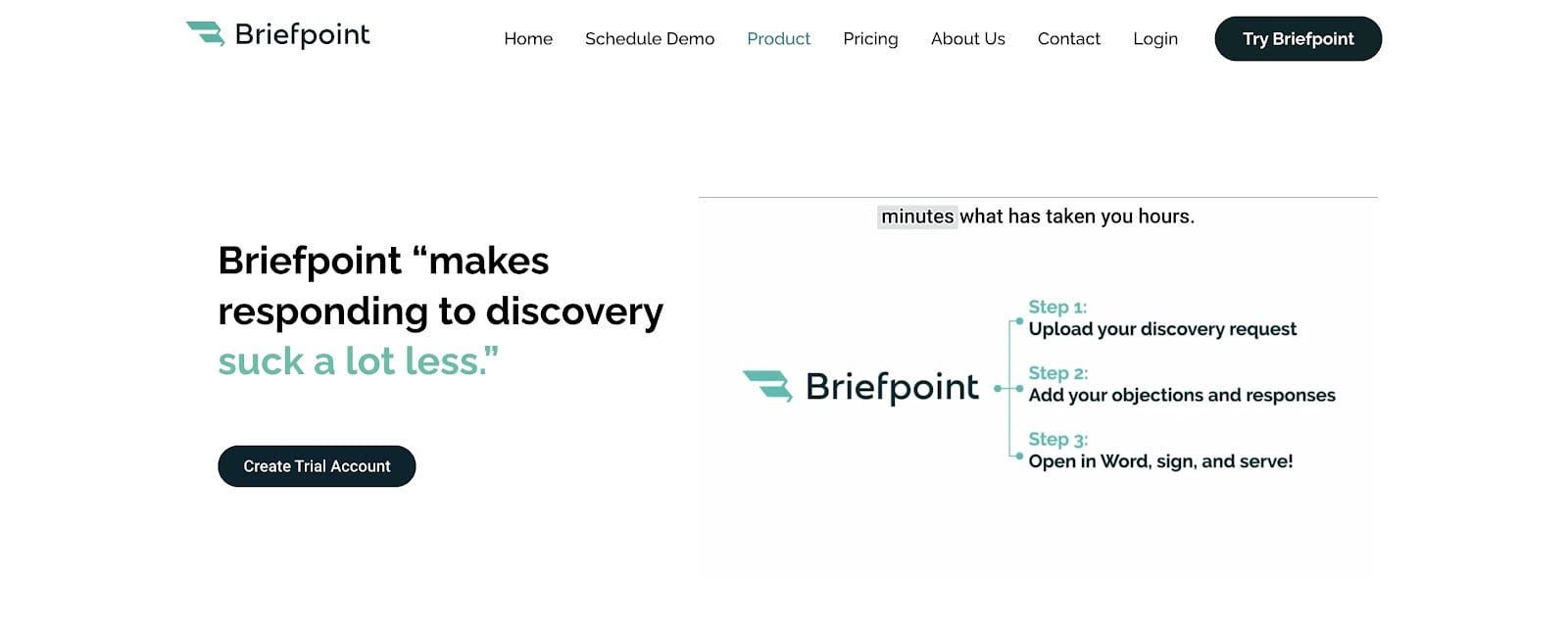
Briefpoint specializes in automating the preparation of discovery requests and response documents, streamlining the response drafting process for various legal documents.
It uses AI to extract key information from documents and assists in creating accurate discovery requests and discovery responses. Briefpoint is designed to simplify this process, saving hours on manual work.
Briefpoint drafts responses by taking your opposing counsels’ discovery requests and turning them into responses to:
Requests for Admission
Requests for Production
Interrogatories
Automate Your First Document For Free With Briefpoint
Discovery responses cost firms $23,240, per year, per attorney. The $23,240 estimate assumes an associate attorney salary of $150,000 (including benefits – or $83 an hour), 20 cases per year/per associate, 4 discovery sets per case, 30 questions per set, 3.5 hours spent responding to each set, and 1800 hours of billable hours per year.
Under these assumptions, you save $20,477 using Briefpoint, per year, per attorney.
Create a free trial account and automate your first document for free.
Or learn about Briefpoint by scheduling a demo here.
2. Clio
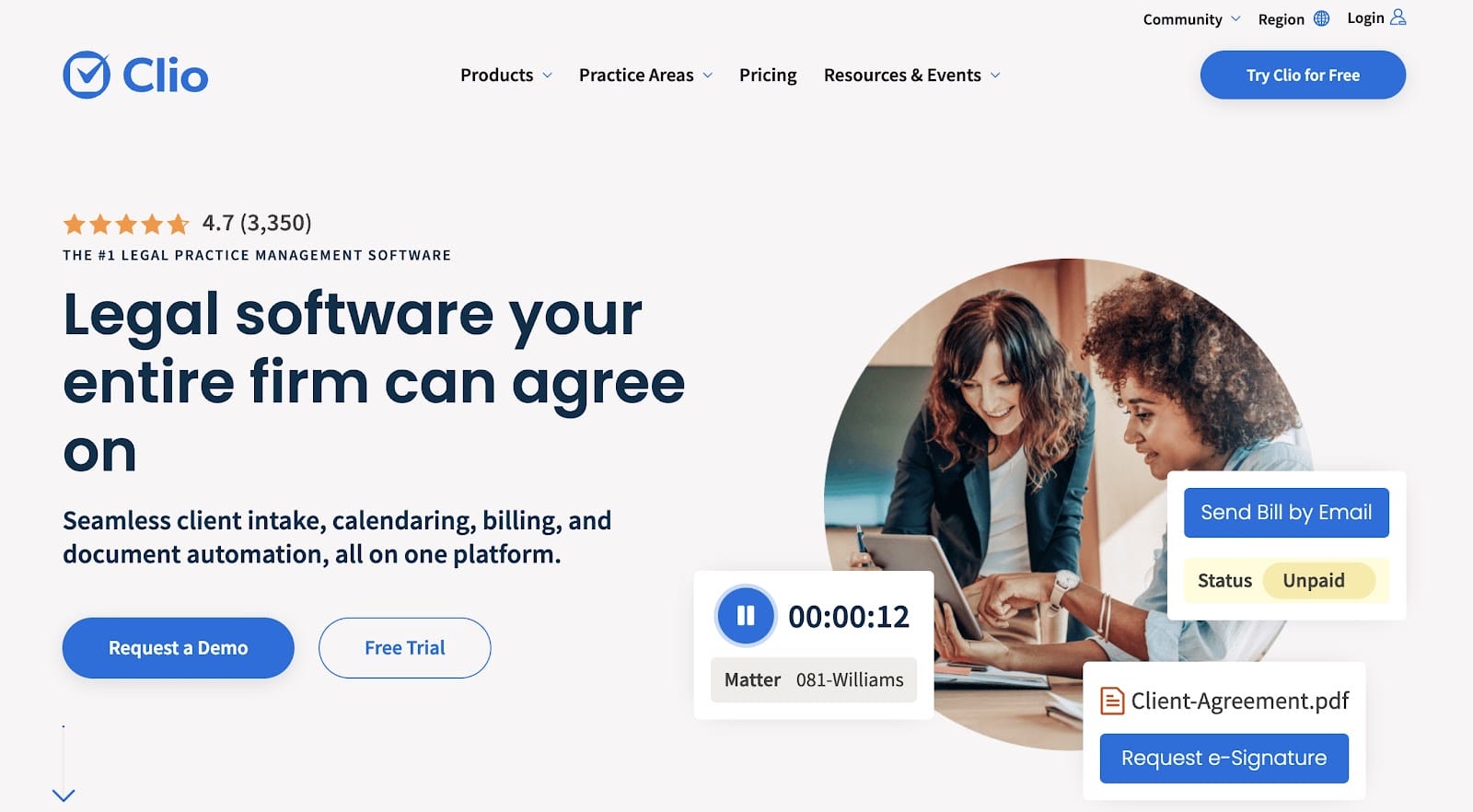
Source: Clio.com
Clio is a comprehensive case management system that is designed to do efficient law practice management. It is highly regarded among legal professionals for its user-friendly interface and powerful features.
Apart from having a centralized dashboard that offers a complete overview of all case information and a document management and automation that enables legal professionals to send documents for electronic signature directly, it can also do comprehensive case management and has the capability to integrate a wide range of external websites and services.
This system not only saves time but also enhances the accuracy and efficiency of legal workflows and is a valuable asset for any law practice. It is a cloud-based solution, making it accessible from anywhere, and is designed to cater to the needs of solo practitioners, small firms, and larger law practices alike.
3. PatentPal
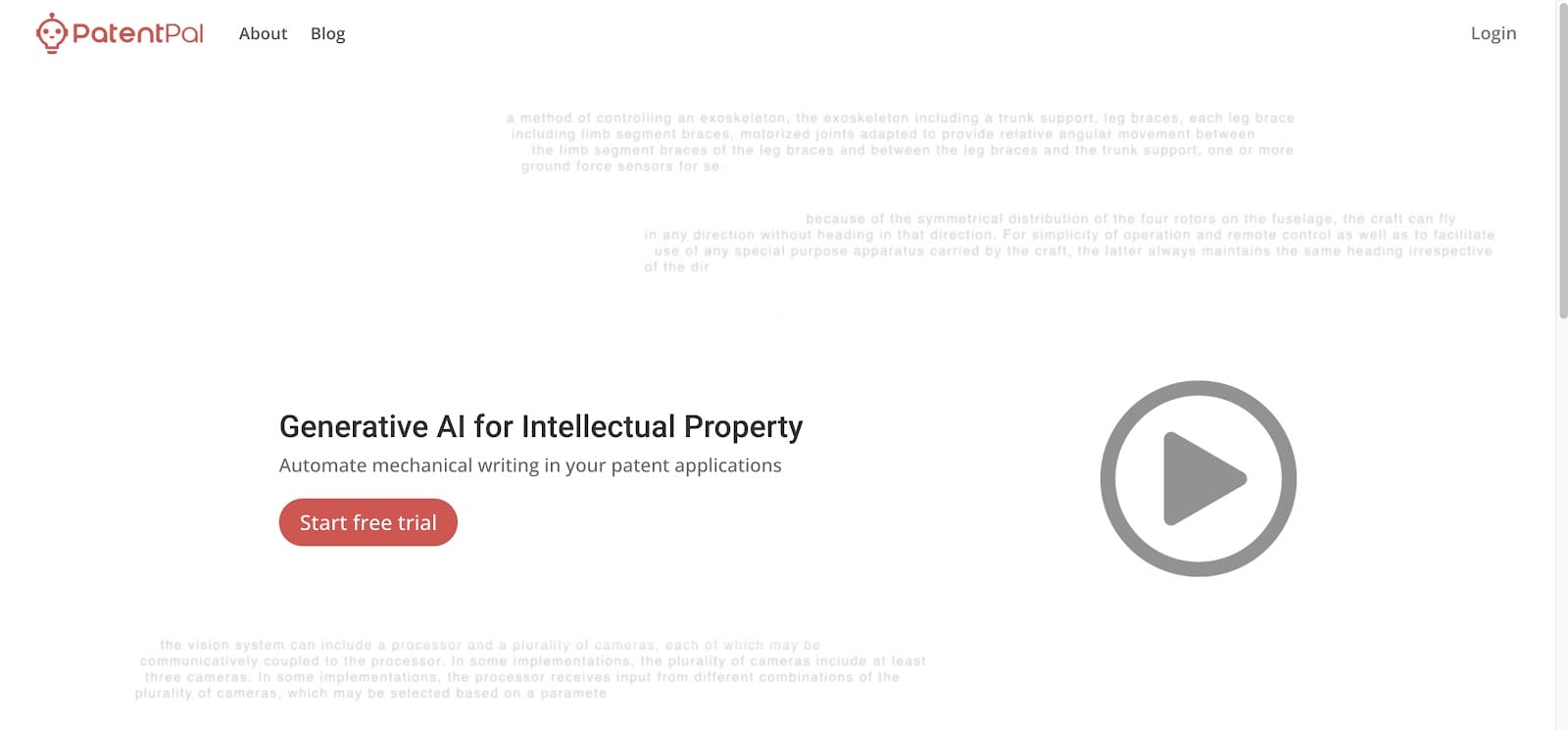
Source: PatentPal
PatentPal is a generative AI platform that significantly streamlines the patent application process. It is specifically designed to aid with Intellectual Property (IP) applications by automating the mechanical writing required in patent applications.
Inventors and legal professionals can easily input their claims into PatentPal, which then generates detailed specifications, illustrative diagrams, and preliminary drafts.
The platform utilizes a knowledge graph extracted from a set of claims, applying a transformer technology similar to GPT-3, which allows for creating accurate and reliable content required in patent applications.
4. Spellbook AI
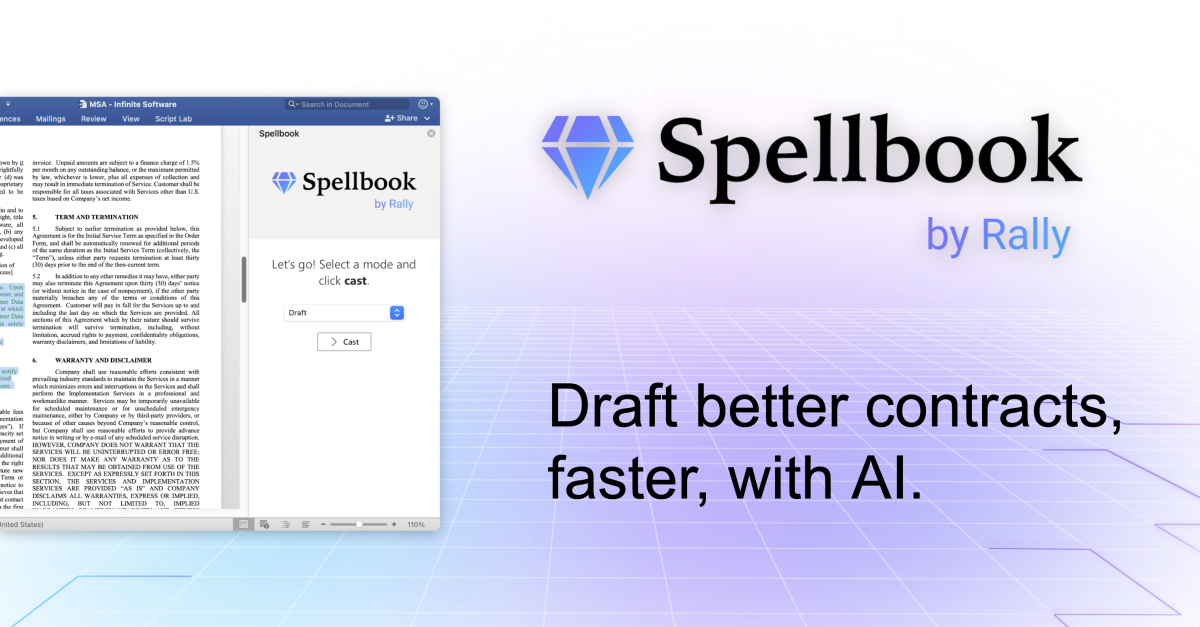
Source: Spellbook
Spellbook AI is a legal software designed to enhance the drafting process and reviewing contracts for corporate and commercial lawyers. It has the capabilities of GPT-4, an AI model developed by OpenAI. It represents a significant advancement in legal technology, providing a powerful tool for lawyers to improve accuracy, efficiency, and speed in contract-related tasks.
Launched in 2022 as the first generative AI copilot for lawyers, Spellbook significantly speeds up the drafting and review process, providing suggestions and automations that align with legal standards and specific needs of each document.
This AI tool is integrated directly with Microsoft Word, making it an addition to the workflow of nearly 2000 law firms and in-house legal teams that utilizes its efficiency and precision in handling legal documents.
5. Casetext
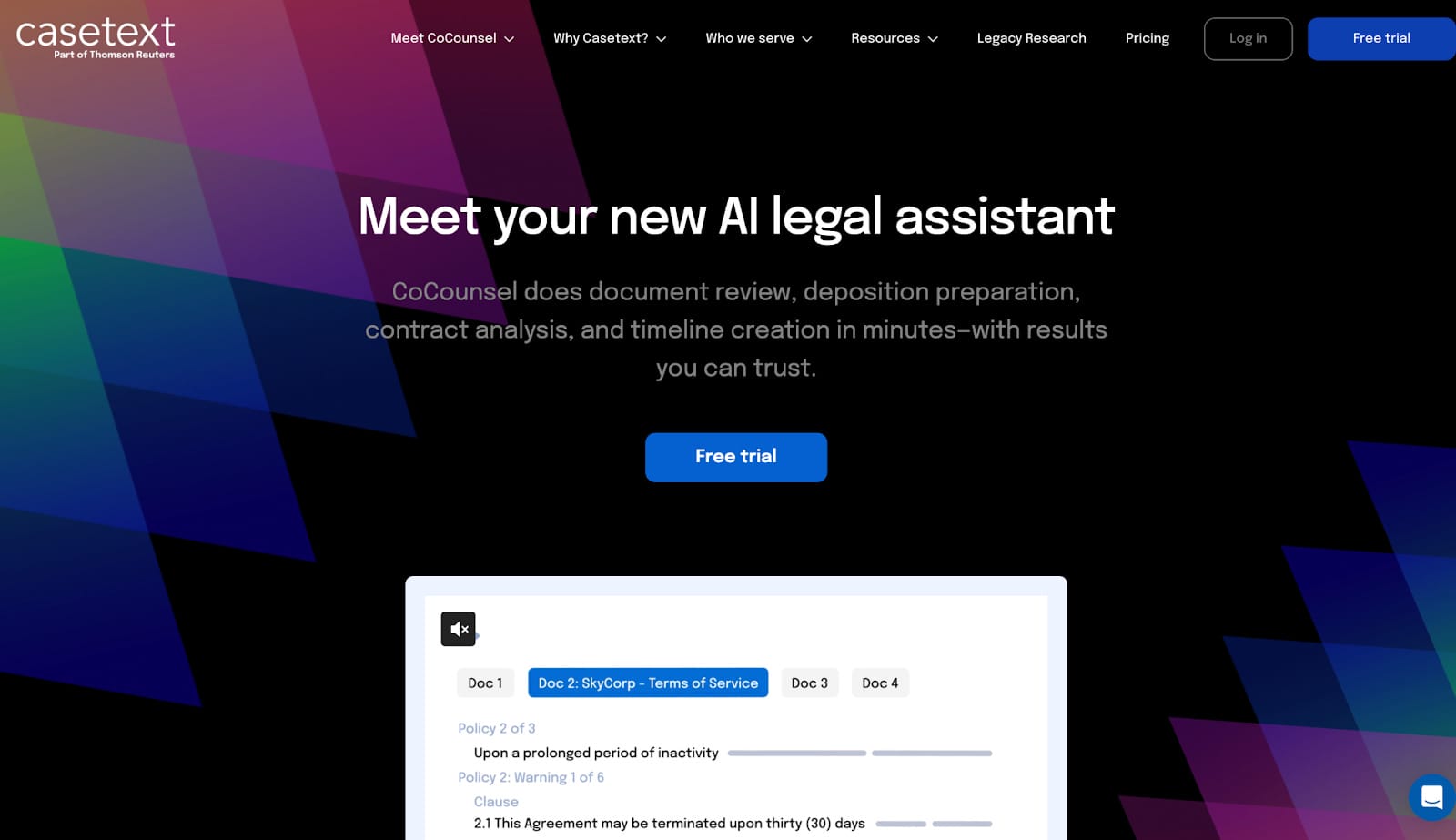
Source: Casetext
Casetext is recognized for its comprehensive suite of AI-driven legal services, notably its CoCounsel AI legal assistant, which accelerates tasks like document review and legal research memos.
Launched in 2013, it garnered the trust of over 10,000 law firms thanks to its ability to enhance legal research and document drafting through AI.
Casetext’s CARA (Case Analysis Research Assistant) uses AI to assist in brief review and informs search results, while CoCounsel, developed with OpenAI technology, aims to help legal professionals accomplish more in less time, such as sifting through vast amounts of discovery documents overnight.
How Legal AI Tools Integrate with Existing Legal Workflows
Legal AI tools act as essential assistants for attorneys, enhancing rather than replacing traditional legal processes. Their integration into law firms with AI tools like. Briefpoint unfolds seamlessly.
These systems complement and strengthen existing processes by increasing time savings and reducing costs simultaneously.
For example, in drafting discovery responses, AI can automate the processes, which helps you save time and reduce the chance of human error. For example, tools like Briefpoint can save up to 87% of the time spent on discovery response documents.
FAQs about Legal AI Tools
Can AI legal tools assist in reducing human error during the review process of legal documents?
Yes, AI legal tools are particularly adept at minimizing human error. They systematically scan through legal documents during the review process and can flag inconsistencies and errors that might be overlooked by a human reviewer. These tools can handle simple tasks with high accuracy and reduce the margin for error.
Can law firms replace lawyers with AI tools?
While generative AI tools are re-shaping the legal industry, artificial intelligence is supposed to help, rather than replace industry professionals.
The information provided on this website does not, and is not intended to, constitute legal advice; instead, all information, content, and materials available on this site are for general informational purposes only. Information on this website may not constitute the most up-to-date legal or other information. This website contains links to other third-party websites. Such links are only for the convenience of the reader, user or browser.
Readers of this website should contact their attorney to obtain advice with respect to any particular legal matter. No reader, user, or browser of this site should act or refrain from acting on the basis of information on this site without first seeking legal advice from counsel in the relevant jurisdiction. Only your individual attorney can provide assurances that the information contained herein – and your interpretation of it – is applicable or appropriate to your particular situation. Use of, and access to, this website or any of the links or resources contained within the site do not create an attorney-client relationship between the reader, user, or browser and website authors, contributors, contributing law firms, or committee members and their respective employers.